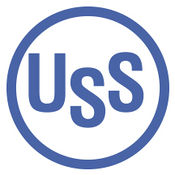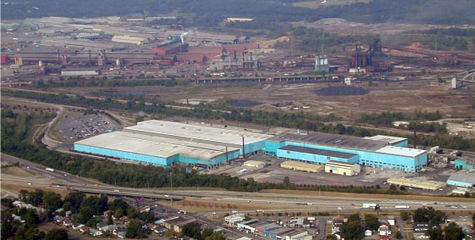U.S. Steel: Difference between revisions
No edit summary |
No edit summary |
||
| Line 5: | Line 5: | ||
TCI operated as a subsidiary of U.S. Steel until it was absorbed as a division of the parent company in [[1952]]. Under Pittsburgh ownership, TCI operated the massive [[Ensley Works]] and constructed the [[Fairfield Works]] in the planned community of [[Fairfield]]. The TCI subsidiary, bolstered by capital and executive leadership from U.S. Steel, proved to be so efficient at making cheap steel that the company levied an internal tariff (the '[[Pittsburgh Tariff]]') in [[1909]] in an effort to prevent the Birmingham product from undercutting the profitability of the Pittsburgh mills. | TCI operated as a subsidiary of U.S. Steel until it was absorbed as a division of the parent company in [[1952]]. Under Pittsburgh ownership, TCI operated the massive [[Ensley Works]] and constructed the [[Fairfield Works]] in the planned community of [[Fairfield]]. The TCI subsidiary, bolstered by capital and executive leadership from U.S. Steel, proved to be so efficient at making cheap steel that the company levied an internal tariff (the '[[Pittsburgh Tariff]]') in [[1909]] in an effort to prevent the Birmingham product from undercutting the profitability of the Pittsburgh mills. | ||
In [[1925]] TCI completed the [[High Ore Line Railroad]], providing a direct supply route from its [[iron ore]] mines at [[Wenonah]] to the furnaces in Fairfield. | |||
The company moved its headquarters offices from the [[Brown-Marx Building]] in [[downtown Birmingham]] to the [[Flintridge Building]] in Fairfield in [[1951]]. In [[1964]] the company consolidated most of its higher-level administrative offices in Pittsburgh. In that same decade, U.S. Steel closed down most of its mining operations and began importing ores and fuels from overseas. | The company moved its headquarters offices from the [[Brown-Marx Building]] in [[downtown Birmingham]] to the [[Flintridge Building]] in Fairfield in [[1951]]. In [[1964]] the company consolidated most of its higher-level administrative offices in Pittsburgh. In that same decade, U.S. Steel closed down most of its mining operations and began importing ores and fuels from overseas. | ||
Revision as of 17:43, 13 November 2015
- This article covers the steel company after reorganization in 1952. For the local subsidiary prior to that, see Tennessee Coal, Iron and Railroad Company.
The United States Steel Corporation is a steel producer based in Pittsburgh, Pennsylvania which has had significant production facilities in the Birmingham District since it acquired controlling interest in the Tennessee Coal, Iron and Railroad Company (TCI) in 1907. The company itself was founded in 1901 when banker J. P. Morgan engineered the merger of the Carnegie Steel Company, Federal Steel Company, National Steel Company.
TCI operated as a subsidiary of U.S. Steel until it was absorbed as a division of the parent company in 1952. Under Pittsburgh ownership, TCI operated the massive Ensley Works and constructed the Fairfield Works in the planned community of Fairfield. The TCI subsidiary, bolstered by capital and executive leadership from U.S. Steel, proved to be so efficient at making cheap steel that the company levied an internal tariff (the 'Pittsburgh Tariff') in 1909 in an effort to prevent the Birmingham product from undercutting the profitability of the Pittsburgh mills.
In 1925 TCI completed the High Ore Line Railroad, providing a direct supply route from its iron ore mines at Wenonah to the furnaces in Fairfield.
The company moved its headquarters offices from the Brown-Marx Building in downtown Birmingham to the Flintridge Building in Fairfield in 1951. In 1964 the company consolidated most of its higher-level administrative offices in Pittsburgh. In that same decade, U.S. Steel closed down most of its mining operations and began importing ores and fuels from overseas.
The corporation was re-organized as USX in 1986, after diversifying into petroleum with the acquisition of Marathon Oil and into real estate development of former mining properties. Those businesses were spun off in 2001.
At its peak during World War II, U.S. Steel employed more than 45,000 workers in the Birmingham District.
The company currently operates the Fairfield Works, one of the company's five integrated steel mills, manufacturing hot-rolled, cold-rolled and coated sheet products; and Fairfield Tubular Operations, which manufactures seamless steel pipe.
References
- Biography of a Business (1960) United States Steel Corporation ISBN B000R2Q8CU
- Warren, Kenneth (2001) Big Steel: The First Century of the United States Steel Corporation, 1901-2001 Pittsburgh, Pennsylvania: University of Pittsburgh Press ISBN 0822941600
- Gray, Jeremy (April 10, 2015) "What would Birmingham be without US Steel?" The Birmingham News
External links
- United States Steel Corporation website
- Fairfield Works and Fairfield Tubuler Operations at ussteel.com


